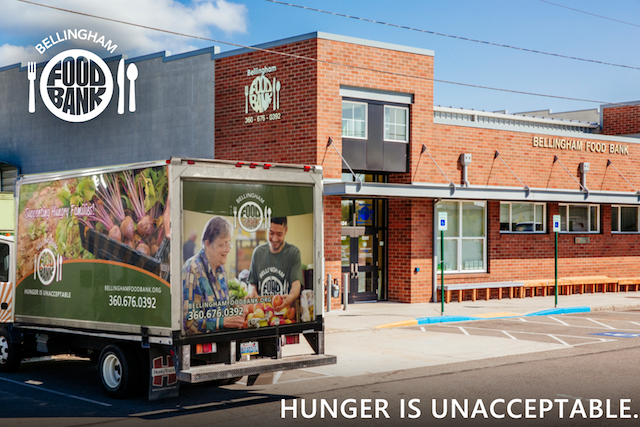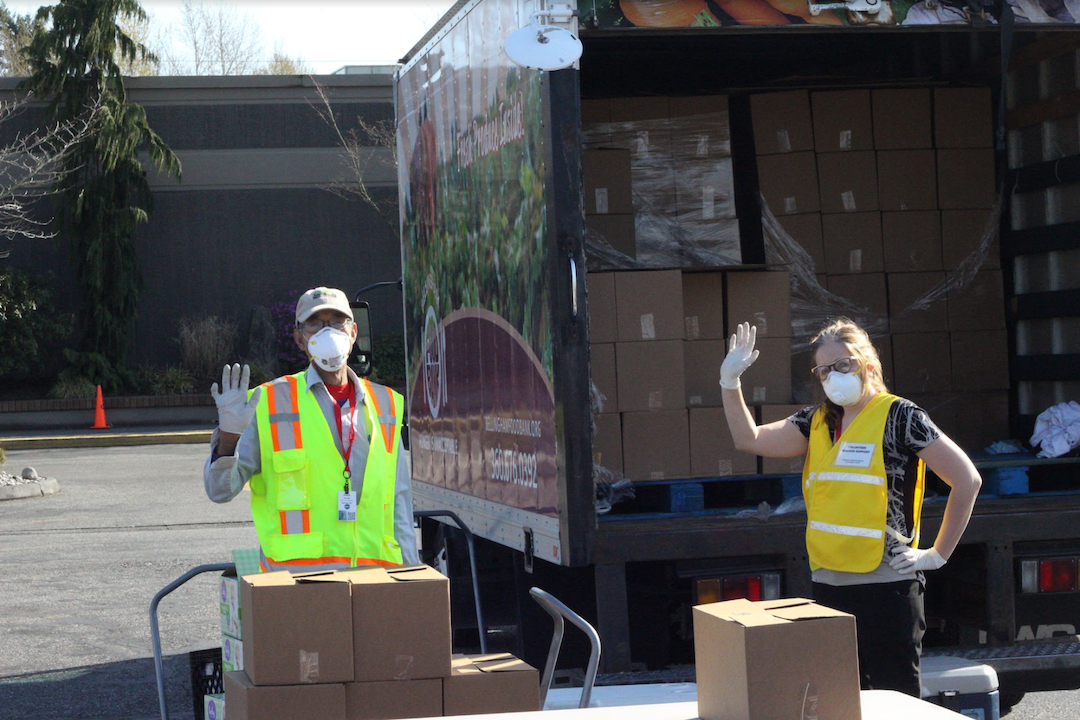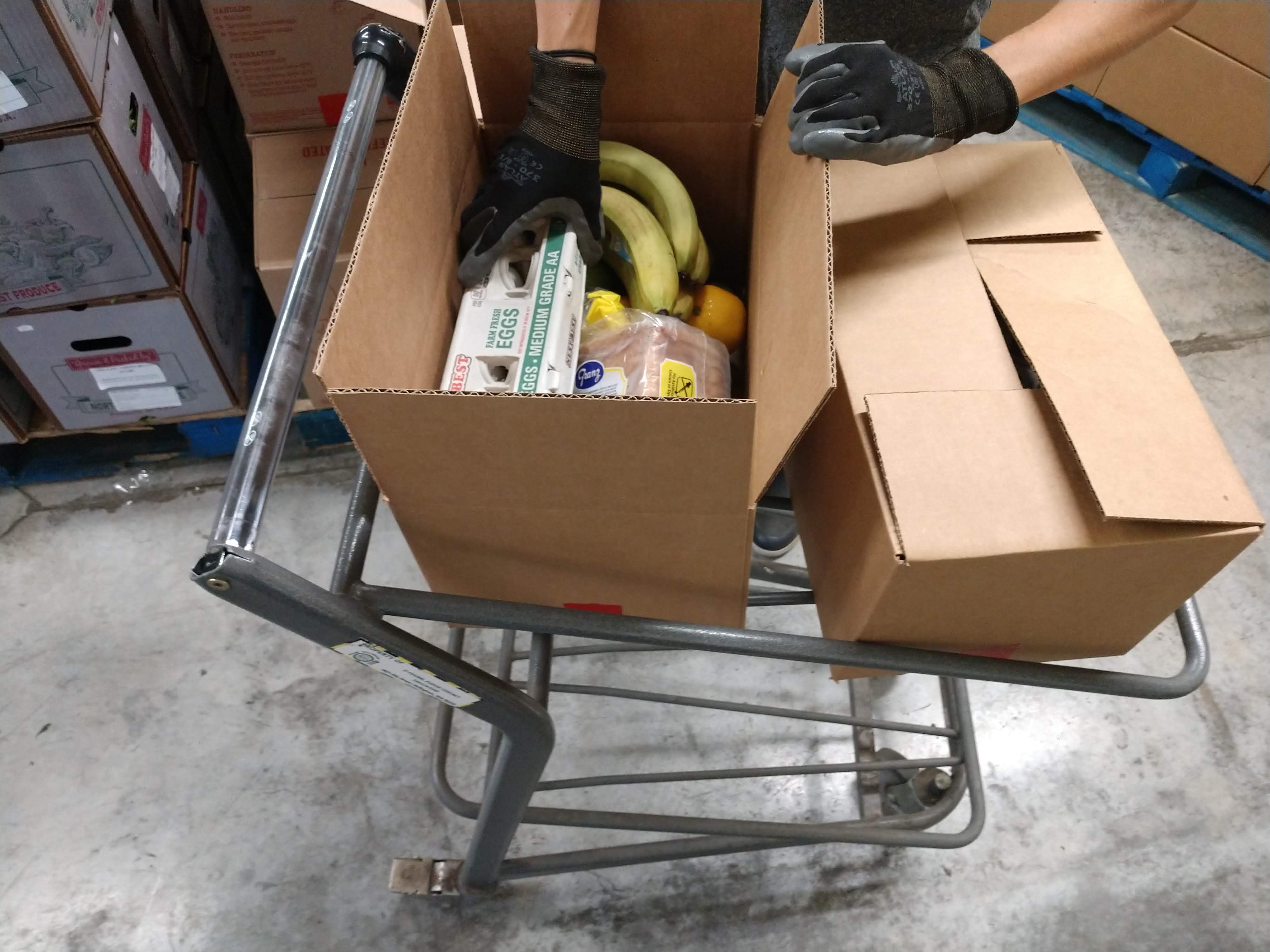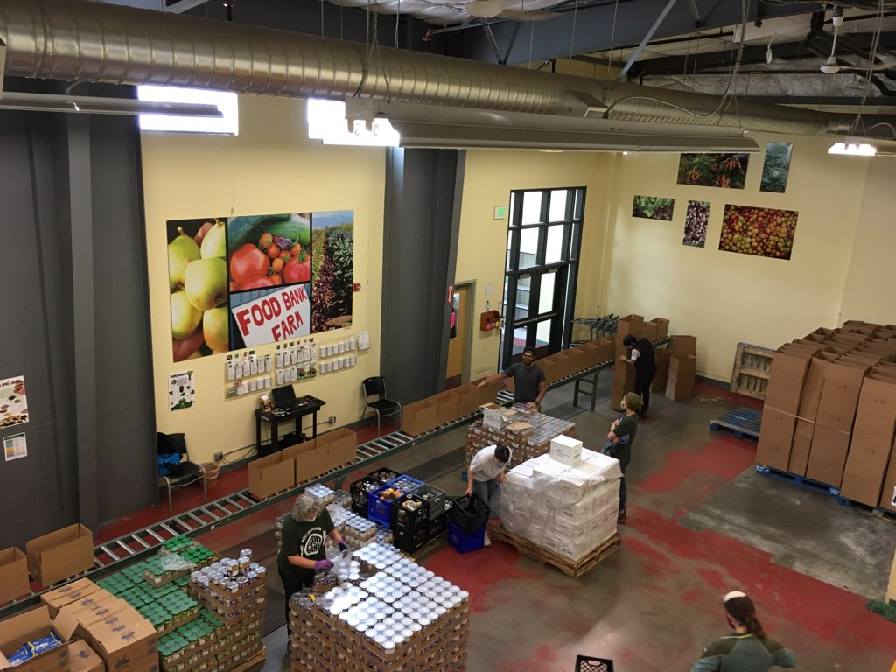Bellingham Food Bank
Editor’s Note: There are over 100 organizations in Whatcom County working to provide supportive services to those experiencing chronic poverty and its associated effects: addiction, homelessness, incarceration, mental illness, and unemployment. Whatcom Watch believes these organizations often labor unnoticed by citizens — this column is designed to add daylight to their endeavors. We have contacted the organization appearing in this column and asked them to explain their mission. Because, in challenging times, being inspired and perhaps empowered by the acts of others is more important than ever.
Bellingham Food Bank
1824 Ellis Steet, Bellingham
Phone: 360-676-0392
Web: http://www.bellinghamfoodbank.org/
For deliveries to homebound high-risk individuals, complete the online form or call the delivery hotline at 360-255-0465.
Food can be donated Monday thru Friday: 8:30 a.m. – 4 p.m.
Drive/Bike/Walk Up Locations
• Shuksan Middle School Parking Lot, 2717 Alderwood Avenue Tuesdays: 1 – 4 p.m.
• Christ the King Church Parking Lot, 4173 Meridian Street Wednesdays: 3 – 6 p.m.
• Bellingham High School, 2020 Cornwall Avenue Thursdays: 1 – 4 p.m.

The Bellingham Food Bank is located at 1824 Ellis Street in Bellingham.
courtesy photo: Bellingham Food Bank
by Mike Cohen
Bellingham Food Bank has been providing hunger relief since 1972. Founded under the name Alternatives to Hunger as a program of the Bellingham Unitarian Fellowship, Bellingham Food Bank began as part of the food rescue movement of the 1970s. Efforts to divert food from waste streams and get it into the kitchens and bellies of community families remain at the core of the Bellingham Food Bank’s purpose almost 50 years later.
These days, the food bank is the busiest emergency food provider in western Washington, with over 225,000 client visits in 2019. Anyone who is in need of assistance is welcome to a food distribution. Visitors include income-limited seniors, college students, working families, people on disability and a transient population. Two weekly visits have been allowed since 2018 — more frequent than most food pantries — in order to ease the burden of transporting the approximate 50 pounds of food-per -visit client families have access to. Those on foot or bike may benefit from taking less food twice, where larger families may max out the allotted food each visit. Programs to provide pre-packed food boxes to homebound folks are also available through partnerships with low-income housing sites and outreach programs. The Bellingham Food Bank is always innovating and trying to improve its services. Prior to Covid-19, a visit to any of the five distributions offered per week would involve a quick and noninvasive intake process, followed by independent shopping among the same categories of items in a small grocery store: bread, dairy, eggs, milk, lots of produce, frozen protein, nonperishable foods, diapers, baby food, formula and menstrual support products. Visitors left with around $75 value of goods and could visit twice per week.
Covid-19 Changes
As a response to Covid-19, the shopping model that provided a dignified experience full of choice like any grocery visit has taken a back seat. A safer, no-contact drive/bike/walk up distribution model is now in place in three locations throughout Bellingham. The intake system is bypassed and pre-packed boxes of the same categories of items as the shopping model are offered. While choice is eliminated, the quality and quantity of food in the boxes is still being carefully curated with a focus on nutrient-density and usefulness. Two visits per week are still allowed, and home delivery efforts have grown exponentially.
The Bellingham Food Bank strongly supports our local economy, especially by working with local growers. Purchases are made year-round with over a dozen farms under contract to grow specific crops for our hunger relief efforts. Additionally, the Small Potatoes Gleaning Project avails skilled staff and hardworking volunteers to harvest crops that would otherwise not make it to market or be plowed under.
Two new agriculture support programs began this summer using an opportunity from the USDA to offset lost markets for growers: Farm to Freezer and Tip the Scales for Hunger Relief. Farm to Freezer buys crops that can readily be processed into soups, stews and sauces to then be frozen and distributed gradually over time.
The Bellingham School District’s central kitchen processes the food, and quarts of the final product are labeled and stored at Bellingham Cold Storage. Tip the Scales for Hunger Relief pays for extra crops at the end of Bellingham Farmers Market days that are collected by Sustainable Connections and then distributed to multiple hunger relief agencies and meal programs. In total, these agriculture programs support dozens of farms with hundreds of thousands of dollars.
Despite modifications for Covid-19, the food bank continued with plans to provide more culturally-appropriate food access to Latinx populations at farmworker housing sites in Whatcom County this summer, with additional satellite programs at three locations. Products were sourced locally whenever available and included tomatillos, Maseca flour and hot peppers.
Partnerships
The Bellingham Food Bank works in partnership with the other food banks and pantries of Whatcom and San Juan counties, as well as meal programs offered by the Opportunity Council, Whatcom Council on Aging, and Bellingham School District. The food bank is the hub for federal and state emergency food assistance programs, streamlining funding and purchase opportunities that benefit all eligible and interested partner organizations.
The Bellingham Food Bank would not be the resource it is without the considerable backing of our community. Folks can get involved as donors, volunteers and advocates. The most valuable donation to the food bank is money, as every dollar donated multiplies 8-12 times when used to purchase from hunger relief wholesalers. For folks who want to donate, but prefer to donate items, cans of protein-rich meats and beans are most sought after, followed by canned fruits, vegetables and peanut butter. Baby diapers of all sizes are also a great help. Volunteers make up the bulk of the the food bank labor force and applications are always accepted. Those who are not in high-risk categories for Covid-19 and who can commit to a weekly 4-6 hour shift are in demand.
For more information, visit bellinghamfoodbank.org, Facebook @bellinghamfoodbank or Instagram @bellinghamfoodbank.
___________________________________
Mike Cohen has led Bellingham Food Bank as executive director for 15 years. He believes hunger is unacceptable and brings that belief to his work and actions every day. He enjoys exploring the beautiful Pacific Northwest with his wife and daughter and taking long hikes with his dogs.
The Bellingham Food Bank is located at 1824 Ellis Street in Bellingham.
Bellingham Food Bank 1824 Ellis Steet, Bellingham Phone: 360-676-0392 Web: http://www.bellinghamfoodbank.org/ For deliveries to homebound high-risk individuals, complete the online form or call the delivery hotline at 360-255-0465. Food can be donated Monday thru Friday: 8:30 a.m. – 4 p.m. Drive/Bike/Walk Up Locations n Shuksan Middle School Parking Lot, 2717 Alderwood Avenue Tuesdays: 1 – 4 p.m. n Christ the King Church Parking Lot, 4173 Meridian Street Wednesdays: 3 – 6 p.m. n Bellingham High School, 2020 Cornwall Avenue Thursdays: 1 – 4 p.m.




